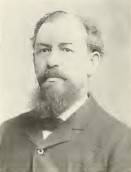 JULIUS HENRY ACKERMANN
is deputy treasurer of the state of Minnesota. He
resides temporarily in St. Paul, but his home is at
Young America, Carver County. Mr. Ackermann is a native
of Thuringia, where he was born at Muehlhausen, January
9, 1844. His father, Henry G. Ackermann, was a
successful miller and land owner, who, when merely a boy
of twelve, was compelled, on account of his fatherís
illness, to take active management of the mill. In the year 1813, when the Russians drove back
Napoleon across Germany, large crowds of Russians passed
the mill at intervals for a period of several months.
The mill being in an isolated situation was chosen as
headquarters by the Russian officers, while the rest of
the army were camped around the mill. These Russian
soldiers appropriated every kind of personal property
and provisions, and practically left the young miller
destitute. But, being of a resolute disposition, he
conducted the business with great diligence and
perseverance, and for a period of fifty years was
successful in his business operations. After losing his
first wife he married Henrietta Henneberg, the mother of
Julius Henry.
JULIUS HENRY ACKERMANN
is deputy treasurer of the state of Minnesota. He
resides temporarily in St. Paul, but his home is at
Young America, Carver County. Mr. Ackermann is a native
of Thuringia, where he was born at Muehlhausen, January
9, 1844. His father, Henry G. Ackermann, was a
successful miller and land owner, who, when merely a boy
of twelve, was compelled, on account of his fatherís
illness, to take active management of the mill. In the year 1813, when the Russians drove back
Napoleon across Germany, large crowds of Russians passed
the mill at intervals for a period of several months.
The mill being in an isolated situation was chosen as
headquarters by the Russian officers, while the rest of
the army were camped around the mill. These Russian
soldiers appropriated every kind of personal property
and provisions, and practically left the young miller
destitute. But, being of a resolute disposition, he
conducted the business with great diligence and
perseverance, and for a period of fifty years was
successful in his business operations. After losing his
first wife he married Henrietta Henneberg, the mother of
Julius Henry.
The subject
of this sketch was the youngest of a family of nine. He
received a common school education and at the same time
received a business education from private tutors. In
1858, at the age of fourteen, he went into business as a
clerk in a large wholesale and retail store in his
native city. In 1862 he emigrated to the United States
and first settled on a farm in Benton township, Carver
County, Minnesota. In 1864, in company with his brother,
Christ, he engaged in mercantile business in the village
of Young America. The following year he put up a steam
flouring and sawmill. The next year, 1866, another
brother, William, came over from Germany and entered
into the partnership, under the firm name of Ackermann
Bros. This firm continued in business until 1875, when
it was dissolved and Julius formed a partnership with
John Truwe, under the firm name of Ackermann & Co.
They continued in the mercantile business until 1893,
taking in as partners in the meantime, August F. Truwe
and A. O. Malmgren. In 1893 the firm was changed to
Truwe & Co., the milling business being continued
under the old name of Ackermann Bros., who, in 1876, had
established a branch in New York City. In 1893 the mill
was rebuilt and incorporated under the name of Ackermann
Bros, Milling Co., who still continue the business. In
1895 Mr. Ackermann disposed of his interest in the store
business, but continued his connection with the
mill.
Julius has
been an active Republican ever since he came of age, and
has always supported the Republican ticket with the
exception of 1872, when he voted for Horace Greeley for
president. In 1871 he was appointed postmaster of Young
America and held that office until 1893. He was elected
town clerk in 1870, and was re-elected each year until
1892. In
1895 he was appointed to the office of deputy state
treasurer under August F. Koerner, state treasurer. Mr.
Ackermann has been a member of the Pioneer Singing
Society of Young America since 1862, and joined the
Masonic order in 1870. In 1883 to 1885 he served his
district as a member of the state senate, and was again
sent to the lower house in 1889. He is now a member of
the Republican state central committee and was sent as a
delegate from Carver County to the Republican state
convention in 1881, and has represented his county in
that capacity in every Republican state convention
since. He was married in 1886 to Paulini Goetze. They have three
children, two sons and one daughter, all grown, the
daughter married and the sons engaged in mercantile
business.